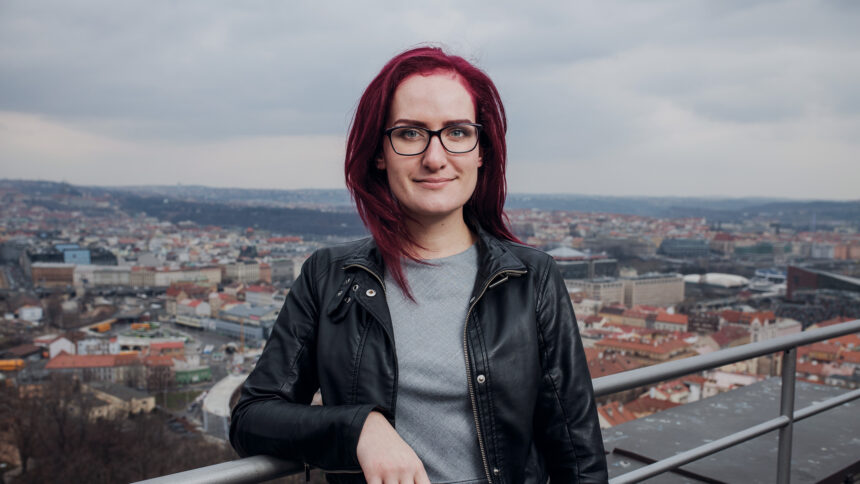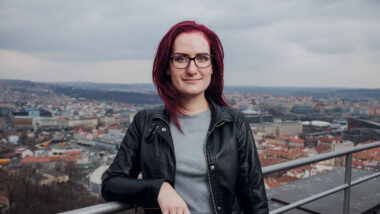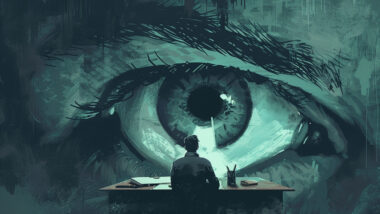Markéta Gregorová represents the Czech Pirate Party in the European Parliament since 2019. The Pirates were decimated in the European election a few months ago, losing three of their four seats, including the only German one. Only Gregorová managed to re-enter the Parliament, where she will again be part of the Greens group.
netzpolitik.org: How does it feel to be the only Pirate in the EU Parliament?
Markéta Gregorová: It’s a little bit lonely, of course. A lot of the decision-making was done with several people, not just the delegates, but also their teams. Dozens of people could help with research, for example. This is no more. In this regard, it gets a little bit lonely, and of course there is a lot of responsibility for the whole Pirate movement on the European level. But I still have my great team, and I can still consult with the previous delegates and with the party. It balances itself out.
netzpolitik.org: How much change does the election result mean for you?
Markéta Gregorová: We were four before, so we had to make compromises in terms of who will go into which committee. Now, I didn’t have to compromise. I was previously mostly in the trade committee, and I’m staying there. I’m also going to the industry committee, where my colleague Mikuláš Peksa used to sit, and to LIBE, the committee for civil liberties, where Patrick Breyer used to be. I will take over a lot of the files that he worked on previously.
Who wants to work on chat control?
There will be a lot of digital rights files – GDPR as well as the famous chat control. So yes, I’m broadening my spectrum of files but still staying in the field of security, especially external security, which was my focus so far.
I am actually looking forward to working on the GDPR recast, because I think it’s one the of the best legislations that came up from this house in the past 10 years. If there can be room for improvement, then it would be an honour if I was given the opportunity to work on it.
In the trade and industry committees, I want to focus on what kind of relationship we have with China, because it will greatly influence our security, global security, our dependencies and strategic autonomy, and I feel like a lot of people are sleeping on it. China has been keeping Russia’s war economy afloat for the past two years, and we are here like, sure, we can do business as usual. I don’t think that’s going to work.
netzpolitik.org: Patrick Breyer was the Greens’ shadow rapporteur on the chat control file. Will you take over that responsibility?
Markéta Gregorová: Well, it’s not decided yet. I’m sort of stating my interest now.
netzpolitik.org: And are you looking forward to working on it?
Markéta Gregorová: Absolutely not. Both based on its content, but also because of what’s going on around it. Luckily, Patrick himself managed to vastly improve the position of the Parliament, but then there was the ongoing fight with the Council, which of course did not vote on it for now. That’s positive news. But it seems like it’s just a problem that’s currently sleeping, waiting to wake up and bother us all again. I don’t look forward to working on it at all and I do hope that it will stay asleep or somehow get pushed away.
We’ll see, based of course on the new Commission, on who will take over the file. I very much look forward to the hearings of the future Commission.
„There needs to be a dedicated Commissioner for internal security“
netzpolitik.org: Sweden has already announced it will not put Johansson forward again, so we’ll definitely have someone new in charge of the chat control proposal at the Commission. In theory, the Commission could just withdraw the whole proposal, right?
Markéta Gregorová: Yes, they could. It will depend on how von der Leyen will divide up the new Commissioners’ portfolios. Because currently, you could say Johannsson does a lot in regards to migration and doesn’t have much time for anything else. Will there be a more digital portfolio? Or will all of it go to one person again, dealing with internal security?
It’s just ridiculous that we still don’t have a system with fewer Commissioners. There was a reform proposal that envisioned 15 Commissioners, right? Then we could talk about having Commissioners with broad portfolios. But if you have 27 Commissioners, as we currently still do, then let them specialise in what really matters.
There needs to be a dedicated Commissioner for internal security, minus migration. Hybrid threats, disinformation, propaganda, foreign interference. It’s not just whatever happens on Facebook – it’s a huge ecosystem of problems. I think there should be a dedicated portfolio, and I know there won’t be one. And I’m afraid of who will end up being responsible for it and what that person will do, and if they will get political support from the rest of the Commission.
„That’s why I believe that the Pirate party should still exist“
netzpolitik.org: How big of a topic are digital rights in the EU currently? For example, in her big speech to the EU Parliament, just before the vote on whether she would get a second term as Commission President, Ursula von der Leyen talked about all her big proposals and ideas. Chat control, probably the biggest digital rights file currently, was not one of them. Why do you think that is?
Markéta Gregorová: If a person is very pessimistic, you could hear von der Leyen talk about it when she mentioned increased policing, funds for Europol and the strengthening of intelligence services. But of course, that’s going against digital rights. I share the sentiment that it is problematic that nobody pays much attention to such an important part of our society and the ever-increasing problem of digital oligopolies. That’s also why I believe that the Pirate party should still exist. How do we differ from the Greens? How do we differ from Volt? We prioritize this topic.
I recently read the book Surveillance Valley, by Yasha Levine. It really puts into perspective the foundation of the internet as whole, that it was founded as a surveillance project by the US government and how we really need to fight for every right because it’s not the default. It hurt me in many places, being a long-time Pirate. I’ve been in the Pirate party for thirteen years, only to read now that we never really had a decentralised, anonymous internet to begin with. It was always someone else’s playground.
I don’t see many people across the political spectrum interested in that, but there are always people passionate about it in the same way that we are. It’s always about finding those contacts, about creating the networks, and trying to work together in negotiations. Such as, for instance, with chat control, where the position of the Parliament would have been vastly different if not for the, like, seven people that were really keen on stopping it. You can make a change, even if you are low in numbers.
netzpolitik.org: What other topics will you be working on?
Markéta Gregorová: We haven’t touched on Ukraine yet, which will still be a big topic of mine. I joined the trade committee for supporting Ukraine, Moldova and others through economic means, trade liberalisation and so on. In the industry committee, it’s through security means, getting ammunition to Ukraine for example. I have been in Ukraine twice in the past month, in Kharkiv and at the eastern front. It will remain my number one priority, probably because you cannot talk about external security and not talk about Ukraine and, naturally, Russia.





0 Ergänzungen
Dieser Artikel ist älter als ein Jahr, daher sind die Ergänzungen geschlossen.